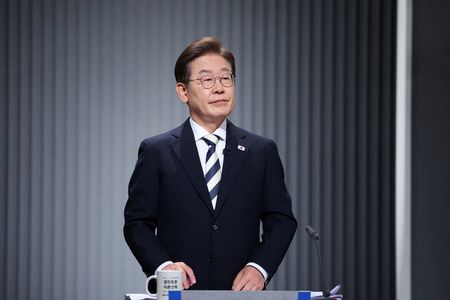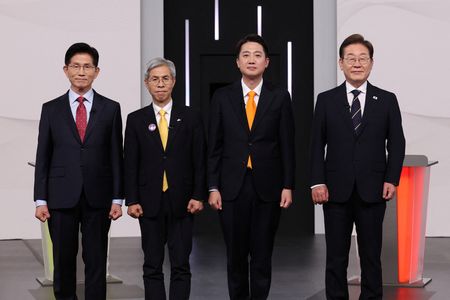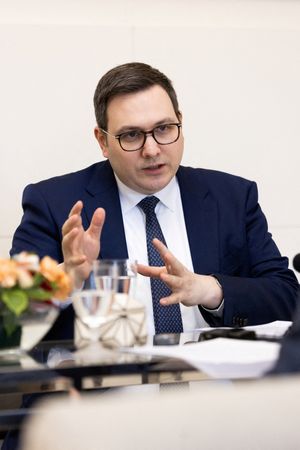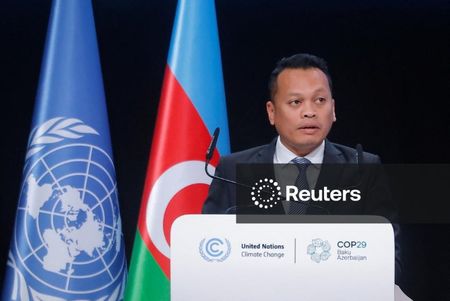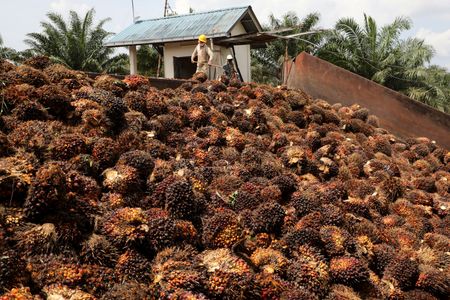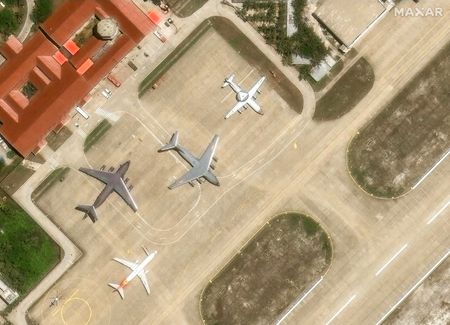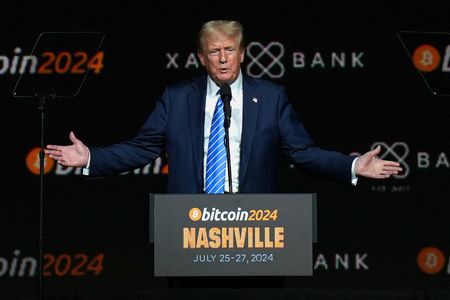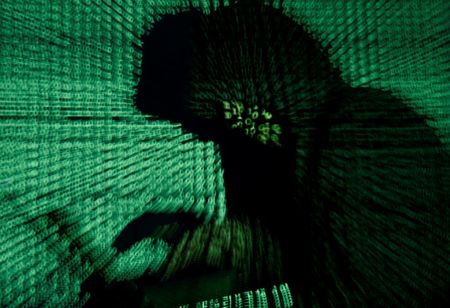By Jack Kim
SEOUL (Reuters) -South Korea’s liberal frontrunner for president, Lee Jae-myung, was leading his main conservative rival Kim Moon-soo by more than 10 percentage points in an opinion poll issued on Tuesday, though the race has tightened a week ahead of the election.
The deeply polarised country holds a snap election on June 3 to pick a successor to ousted leader Yoon Suk Yeol, whose brief martial law imposition heightened long-simmering political disputes and sparked massive nationwide protests.
The next leader will have to mend the reputation of a country that transitioned from dictatorship to a democratic success story in the 1980s while spurring stalled growth, managing uncertain U.S. trade policies and dealing with nuclear-armed North Korea.
The Democratic Party candidate Lee, who has advocated using fiscal policy to support the economy and bringing to justice anyone involved in Yoon’s botched attempt to declare martial law in December, had 49% public support against Kim of the People Power Party with 35%, the Gallup Korea poll showed.
Kim has eroded what was a more than 20 percentage point gap with Lee at the start of the campaign on May 12, but has failed to convince another conservative candidate – New Reform Party’s Lee Jun-seok – to drop out and back him to improve his chances.
Yoon was ousted on April 4 by the Constitutional Court after he was impeached and is on trial on insurrection charges, accused of trying to arrest Lee Jae-myung and others who repeatedly clashed with him while in office.
Third-placed Lee Jun-seok had 11%, according to Tuesday’s poll, which is one of the last major surveys to be published before a week-long blackout period that begins on Wednesday, when new polls are banned from publication by law.
TRADE TALKS
Asia’s fourth-largest economy contracted in the first quarter as exports and consumption stalled, amid fears over the impact of Washington’s aggressive tariffs as well as political turmoil at home.
South Korea has been in trade talks with the United States and is seeking a waiver from the tariffs President Donald Trump announced as his administration pressures Seoul to resolve a large trade imbalance between the partners.
Kim, who was a hardline labour minister under Yoon, has tried to court centrist voters, pledging business-friendly policies including deregulation and investment incentives and a tough stance against North Korea.
Kim has sought to widen his support base by uniting forces with third-placed Lee Jun-seok in a move that could make the race a virtual tie, but his overtures have been rebuffed so far.
In a sign of divisions on the liberal side, however, former prime minister Lee Nak-yon, who represents a minority faction in the Democratic Party, announced his support for Kim on Tuesday, saying Lee’s tendency to abuse majority power must be checked.
Still, Lee is likely to maintain a comfortable lead in the absence of a major unexpected turn that could shake up the race, said Choi Jin, director of the Seoul-based Presidential Leadership Institute.
“It seems almost impossible at this point that (Lee) will make a fatal mistake or that (Kim) will pull off something that will touch the heart of the whole country,” Choi said.
Meanwhile, in a late-night televised debate, Lee Jae-myung said three-way security cooperation with the United States and Japan was key to South Korean diplomacy but added: “I believe there is no need to unnecessarily antagonise China or Russia.”
Kim also said he might consider bolstering South Korea’s security with nuclear weapons, if possible within the bounds of Seoul’s alliance with the United States.
(Reporting by Jack Kim and Joyce LeeEditing by Ed Davies, Saad Sayeed and Gareth Jones)

